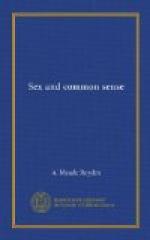In doing this I believe the State does all—or nearly all—that it usefully can to uphold the dignity of marriage and a high standard of morality. I do not believe that it should seek to penalize those whose sex-relationships are not of this character, except so far as legislation for the protection of the immature or the helpless is concerned. And I do not think it should compel—or seek to compel, for compulsion is, in fact, impossible—the observance of a marriage which has lost or never had the elements of reality.
Is this to abandon the ideal I have been upholding? I do not think so. Let us refer again to the greatest of Teachers and the loftiest of Idealists—Jesus Christ. See what He teaches in the Sermon on the Mount and elsewhere. Everywhere He emphasizes the spiritual character of virtue and of sin. To be a murderer it is not necessary to kill: to hate is, in itself, enough. If you hate you are essentially a murderer. To be an adulterer it is not necessary to commit adultery: to look on a woman lustfully is already to have committed adultery with her in your heart. It is the spirit that sins. So keep your spirit pure. It is not enough to keep your oaths: you should be so utterly and transparently sincere that there is no need and no sense in supporting your words by great oaths. “Yea” and “Nay” should be sufficient.
You will notice that the Sermon on the Mount has been divided in this chapter into a number of paragraphs, each of which begins by a reference to the old external law of conduct, and goes on to demand a more searching, more spiritual and interior virtue. “Ye have heard that it was said by them of old time.... But I say unto you.”
“Ye have heard that it was said: ‘Thou shalt not kill’ ... but I say unto you that whosoever is angry shall be in danger of the judgment. Ye have heard that it was said: ‘Thou shalt not commit adultery,’ but I say unto you that whosoever looketh on a woman to lust after her hath committed adultery with her already in his heart.... Ye have heard that it was said: ‘Thou shalt not forswear thyself,’ but I say unto you: ‘Swear not at all.’”
What is the significance of such teaching? Surely that we are not to be satisfied with keeping the letter of the law, but are to keep it in our hearts. So clear is this that the Church has completely abandoned the letter of the last precept. No one except a Quaker refuses to take an oath. Every bishop on the bench has done so, and every incumbent of a living. Nowhere throughout the Sermon on the Mount have Christians felt themselves bound to a literal or legal interpretation of its teaching. No one wants a man to be tried for murder and hanged for hating his brother. No judge grants a divorce because a man or woman has “committed adultery in his heart.” Christ Himself did not literally “turn the other cheek” when struck by a soldier. His disciples everywhere pray in places quite as public as the street-corners forbidden in the next chapter of St. Matthew, and give their alms publicly or in secret as seems to them best.




